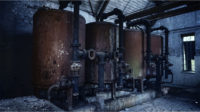Del Mar is primarily a commercial laundry (it doesn't do any dry cleaning) that services hotels and motels. So its stock-in-trade is the laundering of linens, towels, bathrobes, blankets, spreads, table linens, and uniforms. The "French laundry" designation comes from the company's specialization in hand ironing of fancy table linens, such as lace and silk tablecloths. According to Gospodnetich, the owner/president of Del Mar, "We stretch them out on a stretcher and we do them by hand. We have people who ship table linen to us from as far away as Texas and Wyoming."
Being so well established in its niche, the company has been able to operate at capacity for years. Del Mar's 48 employees work in split shifts, keeping the laundry running from 4 a.m. to 5 p.m., seven days a week. The 125 lb of steam pressure that runs the plant is provided by two 100-bhp Miura LX-100SG water tube boilers. Although the company does not run the two boilers at the same time - one week it runs one, and the next week it runs the other - by having two, it knows it always has a backup in case one should go down (which has not happened).
Out with the Old (In a Big Way)
The story of the laundry's switch from a 100-bhp firetube boiler to the Miura water tube boilers goes back to 1995. At that time, an engineer told Gospodnetich about the cost and energy savings that he might achieve with the Miura boilers. "We had an OSHA-ensured boiler that was huge. It took up a whole 12 ft by 20 ft room," Gospodnetich says."When he showed me a picture of a Miura, I asked him if he saw one of these work and he said he had. So, I took his word for it, and I took a chance. It was the best thing that we ever did," he says.
Monterey Boiler installed the first boiler in 1996. According to Miura Boiler vice president Hiro Ohno, who oversaw the sale of the second unit, both installations went quite smoothly. "Because the boiler is packaged on a common base skid and it is so compact, it was easy to put onto the first floor. The biggest issue with these installations was that it was a lot of work cutting the old boilers up to get them out of there," Ohno recalls.
Gospodnetich says the units fast start-up capability has provided unexpected energy savings. Additionally, at Del Mar, the old firetube boiler used 900 gal for start-up, while the water tube takes 60 gal.
The ultra compact boilers' once-through, forced circulation maintains 85% fuel-to-steam efficiency. "We also reuse the steam. Once the steam goes through the plant, it comes back into a huge tank and then as the boiler needs water, it's heated and ready to go," Gospodnetich adds.
The 36.4% Solution
Back in 1998, Pacific Gas and Electric (PG&E) did an energy and cost comparison for Del Mar. According to Gospodnetich, "Up to 2001, I have saved over $43,000 each year and greatly reduced my NOx emissions for Monterey County. I had assumed from its small size that the boiler would be beneficial since it makes steam within five minutes from a cold start-up and saves on fuel with its low water content. However, I did not expect such extraordinary savings.""Also, I now have a tremendous amount of increased space in my boiler room for additional equipment and the temperature in there has become normal instead of extremely hot. It was because of these factors that I decided to replace my second firetube boiler with a Miura for even greater savings," he adds.
The savings had served as a nice bonus, however, with rapidly increasing energy costs, they are now crucial, according to the business' owner. "The current situation in California is killing me right now. My gas cost has tripled," Gospodnetich says. "Since we got the new boiler, my PG&E [bill] had averaged $6,500 - until the last three or four months. Since then, it has gone as high as $22,000 per month. However, our February bill was $19,900."
According to a PG&E 12-month cost comparison of the periods March 1995-February 1996 as compared to March 1996-February 1997, the firetube boiler's average monthly cost was $10,050. It was using 15,000 to 18,000 therms/month compared to the Miura's 11,000 to 14,000 therms/month - for an average monthly savings of $3,656. In other words, Del Mar realized a 36.4% cost savings.
With California's high energy costs, if Del Mar still had the firetube boiler, instead of a high month of $22,000, it would have had a bill for $34,600. "It's probable that, if we didn't have the new boilers, our doors would have been closed three months ago. A lot of businesses are closing up," Gospodnetich says. ES









